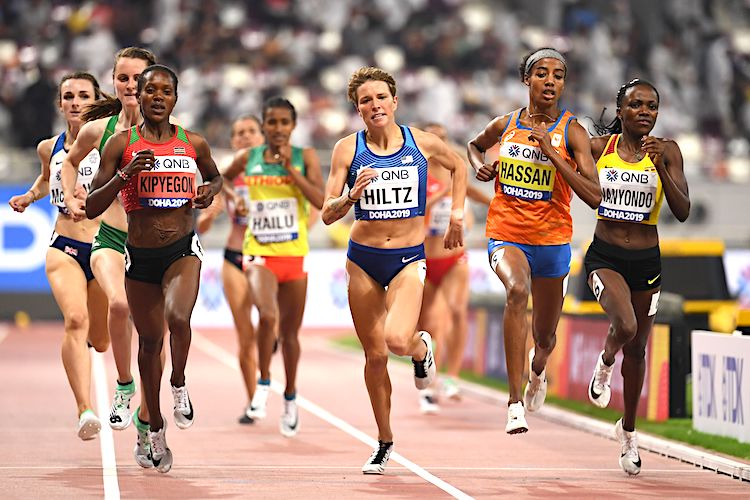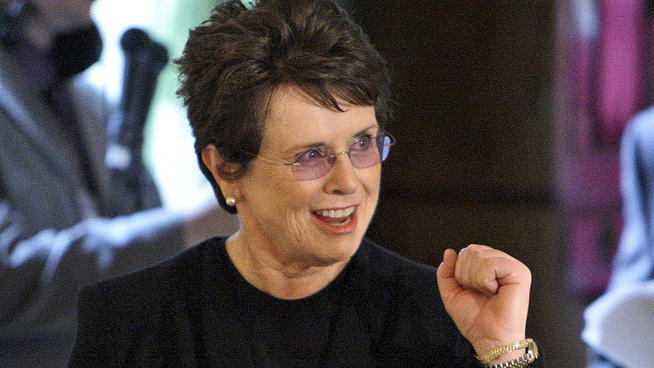
Nikki Hiltz is Making Running LGBTQ Inclusive
The non-binary runner is promoting races for all the letters in the LGBTQ acronym.

(CNN) — Nikki Hiltz figured out their gender identity while running.
Ever since Hiltz ran on the beach barefoot as a child taking part in lifeguard training, running has seeped into almost every aspect of their life, becoming a career that took them to the world championships.
So when all their races were canceled in 2020 due to the Covid-19 pandemic, Hiltz organized their own, naming it Pride 5k to create a space for LGBTQ people and to raise money for The Trevor Project — a nonprofit organization providing 24/7 crisis counseling to LGBTQ youth.
“I was open about my sexuality at that point, but not my gender identity,” Hiltz tells CNN Sport.
“And so I think, deep down, I was just a closeted queer person, trying to make a safe space for people to show up as [themselves]. And kind of subconsciously making that space for me to show up as myself.”
Hiltz says nearly 2,000 people participated from a variety of locations in the first edition of Pride 5k. At least four people used the day to publicly come out as queer, later recording podcasts with Hiltz to share their stories.
“Something about hearing coming out stories, or just connecting with someone who was hiding something and then got to share it. It just really was the last push I needed to be like: ‘OK, I think I’m ready to now come out,'” Hiltz says.
And, in what Hiltz calls a “full circle moment,” they also publicly came out as transgender on March 31, 2021 — Transgender Day of Visibility. That was a little less than nine months after that first Pride 5k race.
“That means I don’t identify with the gender I was assigned at birth,” they wrote in an Instagram post explaining that they are transgender. “The word I use currently to describe my gender is non-binary. The best way I can explain my gender is as fluid.
“Posting this is both exciting and terrifying. But I am and always will be a firm believer that vulnerability and visibility are essential in creating social change and acceptance. So here I am, once again, coming out of a closet to be my true authentic self.”
‘Such an easy bridge.’
After graduating from high school, Hiltz earned a scholarship to the University of Oregon. Later they transferred to run at Arkansas. There they placed second in the women’s 1,500 meters at the 2017 and 2018 NCAA Division I Track and Field Championships.
These results secured Hiltz a professional contract. They also qualified to represent Team USA at the World Athletics Championships a year later.
After coming out as trans and non-binary, Hiltz continues to compete in the women’s division.
“As a non-binary athlete navigating a very gendered world of athletics, it’s easy to feel out of place,” Hiltz wrote in an Instagram post.
“For me, it’s sometimes uncomfortable being the only person on the starting line that uses they/them pronouns.”
This summer, after running what they called their “worst race of the season” at the US championships. They failed to qualify for the worlds team. Hiltz reframed their goals and secured victories in several mile races.
Those are the peaks and troughs of life as a professional athlete. Still, a kernel of the pure joy and competitiveness Hiltz says they felt running as a child remains as they have built a community within the sport.
“I think runners have always been like the weirdest people but the friendliest and the best allies,” they say.
“I’ve only ever gotten support and love from my competitors when it comes to my gender and sexuality, and I just knew that it was going to be such an easy bridge to like, ‘OK, let’s make a Pride parade and 5k and combine them.'”
Alongside their partner, Hiltz has set about organizing this amalgamation of a race with Pride, now finally held with an in-person component in Flagstaff, Arizona, for its third edition. Runners were still invited to participate from remote locations if they preferred.
“You know, I have no business putting on an in-person race,” Hiltz jokes.
“I’m a professional runner, not an event manager, but [for] my partner and I, this is our goal. So we’ve just been figuring it out as we go … There’s definitely been hiccups with the bib orders or the road closures, but it’s just another hurdle we have to get over.”
Olympic steeplechase runner Yemane Haileselassie took victory in the race held on October 6 in Flagstaff with a time of 14:22, while Dani Shanahan won on the women’s side in 16:52.
The winner of the non-binary race, Breanna Cornell, meanwhile, told Hiltz that they would use their $2,000 check to help start a Trevor Project club at their high school, adding to the $37,000 that the event raised for the charity.
“Things like Pride can be a lot of focus on drinking and partying, which is super fun. And obviously, Pride offers a lot of representation,” Hiltz observes.
“But I think when you add in the trauma or the substance abuse that so many LGBTQ people go through, it is really awesome to provide a space where we celebrate Pride, but we also get outside and move our bodies and do something healthy and fun.”
According to the National Institute on Drug Abuse, it’s not yet possible to establish long-term trends about substance abuse in LGBTQ populations given the scarcity of research but the 2018 National Survey on Drug Use and Health (NSDUH) found that those who identified as lesbian, gay, or bisexual reported higher substance use than adults who identify as heterosexual.
‘Why are we passing this entire law?’ – Nikki Hiltz
But even as initiatives such as Hiltz’s Pride 5k seek to make the sport more inclusive, it is becoming increasingly difficult for transgender athletes — particularly transgender women — to compete in categories consistent with their gender identity.
At the elite level, individual sporting federations have adopted a range of policies towards transgender athletes since the International Olympic Committee (IOC) announced its new non-legally binding framework in November 2021.
The IOC’s guidance said that no athlete should be excluded from the competition on the assumption of an advantage due to sex variations or their status as a transgender person and placed the responsibility on individual sporting federations to determine if an athlete was at a disproportionate advantage.
Some governing bodies, such as the International Swimming Federation (FINA), the International Cycling Union (UCI), and the International Rugby League (IRL), have opted to restrict the participation of transgender women, while others, like the German FA, allow transgender and non-binary players to choose a team.
Meanwhile, 18 American states have sought to widen these bans, banning transgender women and girls from participating in sports consistent with their gender identity in youth sports, too, according to data collected by The New York Times and the Human Rights Campaign.
“It’s really sad the way that all these policies are being passed and pushed. And blatantly, it’s just not an issue. I have never raced a trans woman in my life,” Hiltz says.
“And in Utah, there were four trans kids, and only one of them was a trans girl,” they add, referring to a law passed in the state in March when GOP lawmakers overrode Republican Gov. Spencer Cox’s veto of a bill that bans transgender women from competing on women’s and girls’ sports teams.
Republican politicians claimed that transgender women have physical advantages over cisgender women, though a 2017 report in the journal Sports Medicine that reviewed several related studies found “no direct or consistent research” on any such advantage.
“Why are we passing this entire law for this whole state when it affects one little girl who’s just trying to play soccer with their friends?” Hiltz says.
“I think if you actually look at what’s happening, trans women are not dominating sports, and they’re literally just trying to … participate, just like any other kid wanting to play with their friends.”
Five months later, a Utah judge granted a preliminary injunction allowing transgender girls to compete on girls’ teams “only when it is fair, as confidentially determined by a legislature-created commission.”
“We raise money for the Trevor Project, which is a leading national organization for suicide prevention services for LGBTQ youth,” Hiltz adds.
“And it’s no surprise that queer people have higher rates of suicide when you have society saying: ‘You can’t play sports or you don’t belong here.'”
The gender binary into which sport has been traditionally divided is being challenged by the increasing visibility of non-binary, as well as transgender, athletes.
Since coming out as trans and non-binary last year, Hiltz has had conversations with race directors and announcers about making running more inclusive.
“When the people that are calling the race misgender, me and then they apologize, I can’t just be like, ‘Oh, no worries, it’s okay.’ Because it’s not,” they say.
“I think there’s definitely been awkward moments with that. But, overall, the longer that I’m out and the more people that know my pronouns and use them, it has been really rewarding.”
This year, three marathon majors — Boston, London, and Chicago — joined the New York Marathon in becoming the highest profile races yet to add a non-binary division to their event programs.
“You train for months, years even for [a marathon]. At the very least, you should be able to sign up for the race that has the gender that you are,” Hiltz says.
“I think it’s really powerful to see … and I think it’s just going to create a space for more and more people to be themselves.”
The-CNN-Wire
™ & © 2022 Cable News Network, Inc., a Warner Bros. Discovery Company. All rights reserved.
WHAT TO READ NEXT: Ellia Green Becomes First Olympian to Transition to a Man










